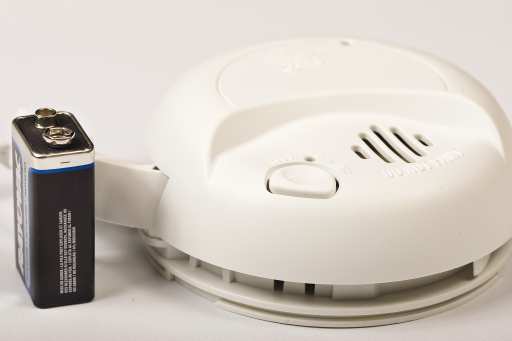Adam Prudhomme
Editor
Greater Napanee Emergency Services is encouraging residents to ‘learn the sounds of fire safety’ for this year’s Fire Prevention Week, which runs Oct. 3-9.
Sounds of fire safety are the theme for this year, which focuses on the differences between a smoke alarm screech and a carbon monoxide warning.
“Alarms now, everybody knows the full alarm sound but there’s other sounds that could indicate different issues,” said GNES public educator Randy Cook. “A lot of alarms now incorporate smoke and carbon monoxide, in which case the beeping pattern will be different. As always a chirp intermittently every 30 to 40 seconds usually indicates the battery is getting low on power, which means change the battery. If you change the battery and it still intermittently beeps, it’s probably telling you that the alarm is at the end of its life because all smoke alarms must be replaced after 10 years, that’s their life span.”
Cook says too often people will hang a smoke alarm and forget about it-which is often just the same as not having one at all.
“We see a lot of houses that are actually unprotected with smoke alarms because people neglect to test them every month,” said Cook. “If they’re older than 10 years, they could have missing or dead batteries.”
Smoke alarm technology has also come a long way in recent years and some can include strobe lights for the hard of hearing or will even shake a bed to help awaken someone who may be hard of hearing or visually impaired. For convenience there are even some that come with remote key fobs, which can be used to ‘hush’ a false alarm with a single click of a button.
“They’re better on the ceiling,” Cook says of smoke alarms. “We don’t want you climbing on chairs of furniture to test it, so you can always use the handle of a broom or mop or a ruler and they should be tested every month.”
Having working smoke and carbon monoxide detectors isn’t just a good idea; it’s a legal requirement.
“It’s actually the law to have a working smoke alarm on every level of the home and a carbon monoxide near the sleeping areas if you burn a fossil fuel or have an attached garage,” added Cook.
Campers and recreation vehicle also require working smoke and carbon monoxide detectors, particularly ones that use propane.
As the cooler weather arrives it’s also a good time to clean out any chimneys and heater ducts and to ensure all vents are unblocked.
For more information or to answer any questions relating to smoke alarms, contact GNES at 613-354-3351.
Fire Prevention Week is held the first full week of October in memory of the great Chicago fire, which raged Oct. 8-10, 1871. The fire killed about 300 people and destroyed roughly 3.3 square miles of the city. Fire Prevention Week was first established in 1925 and remains the longest public education week of its kind in North America.

